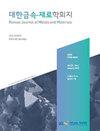Tensile and Fatigue Properties of WC-20 wt%Co Cemented Carbides under Microstructural Variations
IF 1.4
4区 材料科学
Q4 MATERIALS SCIENCE, MULTIDISCIPLINARY
引用次数: 0
Abstract
WC-Co cemented carbide has excellent mechanical properties and is widely used in many industrial applications including cold forging dies and cutting tools. The tensile and fatigue properties of WC-20wt%Co cemented carbides with microstructural variations were investigated. Microstructure parameters such as Co binder content, WC particle size, binder mean free path, and contiguity were obtained by linear intercept method using BSE microstructure images. Standard specimens of WC-20wt%Co cemented carbides were prepared for tensile and fatigue testing. Uniaxial tensile stress-strain curves and tensile-compression fatigue S-N curves were obtained. The 22Co-Cr alloy with higher Co content showed the largest binder mean free path and the lowest continuity. The 20Co-dwc alloy with fine WC grains of submicron size showed the lowest binder mean free path due to fine WC grain distribution. The 20Co-dwc alloy with fine WC grains showed the highest tensile strength and fatigue strength, compared to other alloys. The 22Co-Cr alloy with a higher FCC Co phase content, which has excellent plastic deformability, showed higher fatigue properties. The fatigue life of the 22Co-Cr alloy increased with increasing compressive mean stress level. Based on the axial tensile and fatigue properties, a reasonable fatigue life prediction of WC-20wt%Co cemented carbide dies for cold forging can be estimated.微结构变化下 WC-20 wt%Co 硬质合金的拉伸和疲劳性能
WC-Co硬质合金具有优异的机械性能,广泛应用于冷锻模和切削工具等工业领域。研究了WC-20wt%Co硬质合金微观组织变化的拉伸和疲劳性能。利用BSE显微结构图像,采用线性截距法获得了Co粘结剂含量、WC粒度、粘结剂平均自由程和连续度等显微结构参数。制备了WC-20wt%Co硬质合金的标准试样,进行了拉伸和疲劳试验。得到了单轴拉伸应力-应变曲线和拉伸-压缩疲劳S-N曲线。Co含量高的22Co-Cr合金粘结剂平均自由程最大,连续度最低。亚微米级WC晶粒细小的20Co-dwc合金由于WC晶粒分布细小,粘结剂平均自由程最低。WC晶粒细小的20Co-dwc合金具有最高的抗拉强度和疲劳强度。FCC Co相含量较高的22Co-Cr合金具有良好的塑性变形能力,具有较高的疲劳性能。22Co-Cr合金的疲劳寿命随着平均压应力水平的增加而增加。根据WC-20wt%Co硬质合金冷锻模具的轴向拉伸和疲劳性能,可以合理地预测其疲劳寿命。
本文章由计算机程序翻译,如有差异,请以英文原文为准。
求助全文
约1分钟内获得全文
求助全文
来源期刊

Korean Journal of Metals and Materials
MATERIALS SCIENCE, MULTIDISCIPLINARY-METALLURGY & METALLURGICAL ENGINEERING
CiteScore
1.80
自引率
58.30%
发文量
100
审稿时长
4-8 weeks
期刊介绍:
The Korean Journal of Metals and Materials is a representative Korean-language journal of the Korean Institute of Metals and Materials (KIM); it publishes domestic and foreign academic papers related to metals and materials, in abroad range of fields from metals and materials to nano-materials, biomaterials, functional materials, energy materials, and new materials, and its official ISO designation is Korean J. Met. Mater.
 求助内容:
求助内容: 应助结果提醒方式:
应助结果提醒方式:


